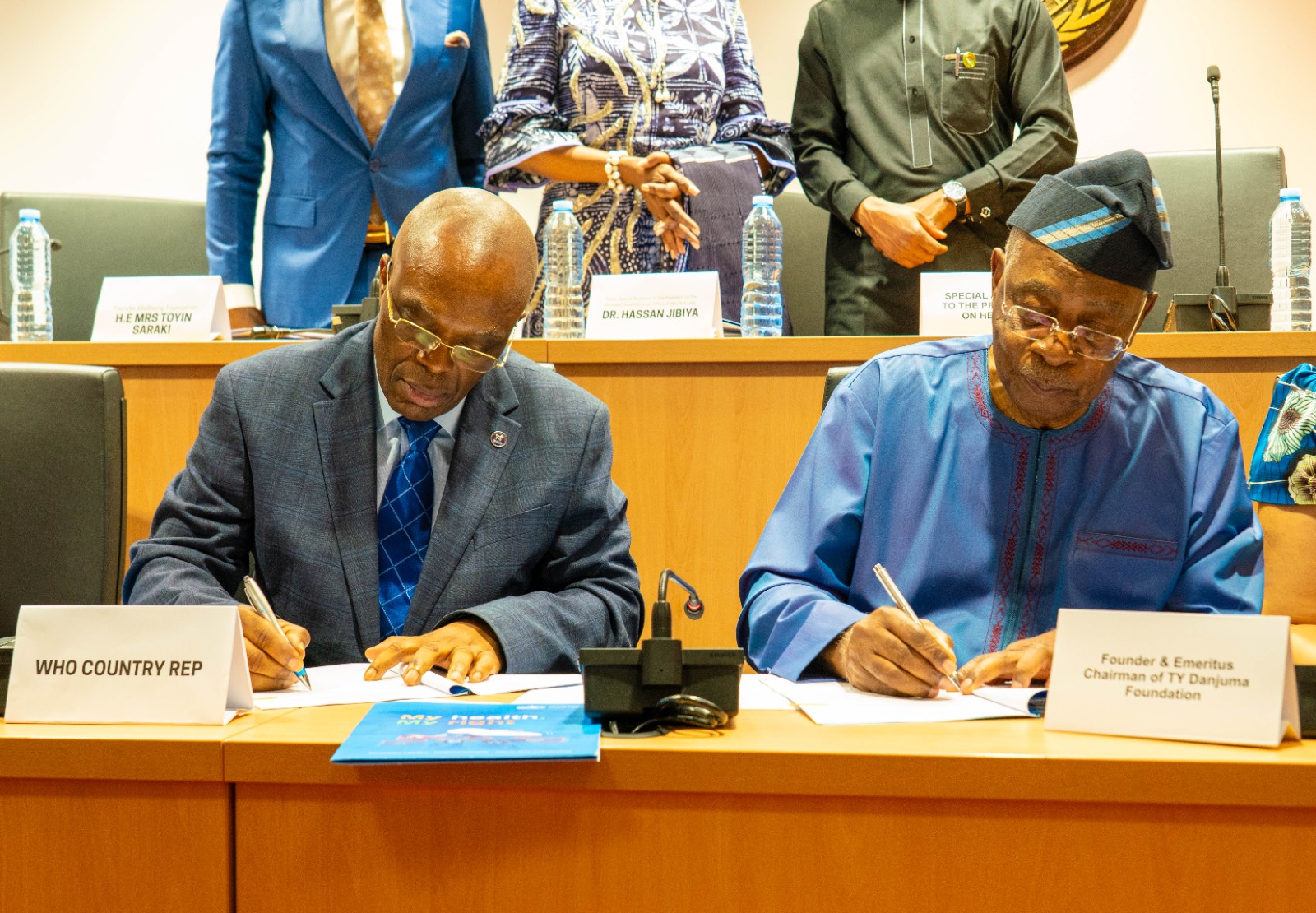Two years into President Bola Tinubu’s tenure, Nigeria’s health sector remains fragile, swamped with various interventions, yet still burdened by old challenges.
Despite campaign promises of reforms and some execution, the country continues to grapple with underfunding, inadequate infrastructure, workforce shortages, recurring disease outbreaks, electricity crises in hospitals, and limited access to healthcare services.
In his Renewed Hope manifesto, Mr Tinubu laid out an ambitious vision for the sector, centred on Universal Health Coverage (UHC) and strengthening the systems.
He pledged to expand insurance coverage to at least 40 per cent of the population within two years, scale up the National Health Insurance Authority (NHIA), and revitalise primary healthcare facilities.
Mr Tinubu also committed to addressing the brain drain in Nigeria’s healthcare sector.
However, despite some positive policy moves and funding efforts by the Tinubu administration, the persistence of old challenges in the sector raises questions about its capacity to improve healthcare in Nigeria through the “Renewed Hope” agenda.
 National Health Budget
National Health BudgetPromising starts
Since assuming office in May 2023, Mr Tinubu has introduced various reforms to transform healthcare delivery in the country.
Nigerians need credible journalism. Help us report it.
Support journalism driven by facts, created by Nigerians for Nigerians. Our thorough, researched reporting relies on the support of readers like you.
Help us maintain free and accessible news for all with a small donation.
Every contribution guarantees that we can keep delivering important stories —no paywalls, just quality journalism.
The Nigeria Health Sector Renewal Investment Initiative (NHSRII) was launched in December 2023 with the goal of achieving UHC by 2030. This initiative, backed by the National Council on Health, focuses on leveraging the Basic Health Care Provision Fund (BHCPF).
The NHSRII aims to enhance Reproductive, Maternal, Newborn, and Child Health (RMNCH), and to strengthen primary healthcare by revitalising 17,000 PHCs.
By mid-2024, the State House confirmed that over $2.2 billion in external financing had been mobilised for the NHSRII through financial commitments from various development partners.
In a recent interview, the Director-General of NHIA, Kelechi Ohiri, reported a growth in health insurance coverage from “16.7 million to 20 million people” in just one year.
Mr Ohiri said Nigeria has already surpassed its 2025 enrolment target, “and we are at the 2026 target.” Also, a 2024 survey by NOI Polls revealed that only about 19 in 100 Nigerians have health insurance. All these highlight the need for continued efforts to expand coverage.
In June 2024, Mr Tinubu signed an Executive Order on Healthcare, which became operational in October. The order wants to make healthcare more affordable, expand access, and prioritise local pharmaceutical production.
While these policy moves and investments signal a shift toward reform, experts say there is a long way to go. At the 2025 Strategic Health Summit, government officials and health advocates assessed the sector’s progress and acknowledged that significant gaps persist.
Health sector funding
Adequate funding remains a persistent challenge in Nigeria’s push for Universal Health Coverage. One of Mr Tinubu’s early promises was to boost funding for the health sector through increased investment and budget allocation.
However, funding levels still fall short of global standards two years later.
In the 2024 budget, the federal government allocated N1.23 trillion to the health sector, about 5.46 per cent of the total budget. While this was a slight increase from N1.17 trillion in 2023, it represented a drop in percentage terms from 5.8 per cent allocation the previous year.
The funds were directed largely at expanding health insurance and strengthening primary care through the BHCPF.
For 2025, the allocation nearly doubled to N2.48 trillion, accounting for 5.18 per cent of the total N47.9 trillion national budget. This includes more support for infrastructure and further investment in the BHCPF.
In response to the US aid cuts, Nigeria’s National Assembly approved an additional N300 billion for the health sector in the 2025 budget. The overall budget was N54.99 trillion, reflecting an increase of over N700 billion from the N54.2 trillion proposed by Mr Tinubu.
While this signals an increased domestic investment in health, it still falls short of the Abuja Declaration’s 15 per cent benchmark for health spending, raising doubts about whether current investments are enough to support Mr Tinubu’s vision for the sector.
The move, however, indicates an effort to reduce overreliance on foreign aid and enhance the country’s capacity to fund critical health initiatives such as HIV/AIDS treatment and immunisation.
Workforce Shortage
Mr Tinubu’s priorities include addressing the shortage of skilled health workers and improving their welfare.
Nigeria’s Minister of State for Health and Social Welfare, Iziaq Salako, recently revealed that 50,000 frontline workers have been trained to reach 120,000 communities to provide integrated, people-centred care.
While this is a positive move, the major challenge is not just training but also retaining these professionals.
Nigeria loses its health workforce at an alarming rate every year. The Coordinating Minister of Health and Social Welfare, Muhammad Pate, recently revealed that over 16,000 doctors left the country in the last five to seven years, causing the doctor-to-population ratio to drop to 3.9 per 10,000 people.
In 2024, Mr Pate also disclosed that Nigeria had about 55,000 licensed doctors serving a population of over 200 million. This figure falls below the WHO threshold density of 4.45 health workers per 1000 people needed to deliver essential health services.
The problem is compounded by the migration of over 1,300 consultants in the past five years and the looming retirement of more than 1,700 senior professionals.
 Thematic areas of the health workers migration policy
Thematic areas of the health workers migration policyPoor working conditions, low pay, and limited opportunities are the major factors behind the exodus of health workers. Although about 3,000 doctors graduate yearly, many prefer to migrate shortly after qualifying. In 2024, only 58,000 of Nigeria’s 130,000 registered doctors renewed their licenses, a signal of growing disengagement.
In response, the government approved a National Policy on Health Workforce Migration and allocated N46 million in the 2025 budget for its implementation. However, there are concerns that this amount is inadequate to address the scale of the problem.
The chairperson of the Lagos State branch of the Nigerian Medical Association (NMA), Babajide Saheed, argued that there has been little progress in the health sector, citing persistent issues such as the Japa syndrome, human resource shortages, poor infrastructure, and rising medical tourism.
Mr Saheed urged President Tinubu to “rejig the federal health system to ensure the delivery of qualitative, accessible, and affordable healthcare.”
According to him, tackling the Japa trend requires better remuneration for healthcare workers, including non-taxable call duty allowances and improved welfare packages.
Disease outbreaks
Despite various health sector interventions, Nigeria remains vulnerable to recurring disease outbreaks, exposing the weakness of its healthcare system.
These outbreaks, which include diphtheria, cholera, and Lassa fever, not only reveal gaps in emergency preparedness but also underscore the country’s limited investment in public health infrastructure, particularly in Infection Prevention and Control (IPC).
In 2024, the country faced a significant diphtheria outbreak, with over 24,000 cases and 1,264 deaths reported by February 2025. The outbreak predominantly affected children in northern states such as Kano, Borno, and Katsina, where vaccination coverage remains minimal.
The WHO has continued emphasising the urgent need for stronger immunisation systems and routine vaccination coverage to curb future outbreaks.
Cholera also posed a major challenge, with Lagos State accounting for 43 per cent of the 17,139 cases and 603 deaths reported nationwide in 2024. The outbreak was linked to water contamination, highlighting the need for enhanced water sanitation and hygiene practices.
Between January and March 2025, Nigeria recorded 1,227 cholera cases and 28 deaths, placing it among the most affected countries in the African region. This situation underscores the critical importance of investing in Water, Sanitation, and Hygiene (WASH) infrastructure to prevent future outbreaks.
Lassa fever remained endemic, with 1,059 confirmed cases and 175 deaths reported across 28 states in 2024. The disease’s impact was exacerbated by the infection of 35 healthcare workers, highlighting gaps in infection prevention and control measures.
As of early 2025, 18 states had recorded at least one confirmed case across 93 Local Government Areas (LGAs), with 4,881 suspected cases, 717 confirmed cases, and 138 deaths.
While routine immunisation remains a challenge, some progress was made in 2024. Nigeria became the first country to roll out the new MenFive meningitis vaccine and also launched the Oxford R21 malaria vaccine in pilot programmes in Kebbi and Bayelsa states, with plans for nationwide expansion.
Still, gaps persist. According to UNICEF, Nigeria has the world’s highest number of unvaccinated children, with 2.1 million out of 8.7 million children under one year yet to receive a single routine vaccine dose.
Infection Prevention and Control (IPC)
 Nigeria’s Health Workforce in Decline
Nigeria’s Health Workforce in DeclineBeyond vaccination, experts advocate that stronger investments in IPC are needed to curtail future outbreaks. Yet, funding has remained a persistent issue.
There was no dedicated budgetary allocation for IPC in 2024, despite the WHO’s global action plan for IPC running from 2024 to 2030.
Data from Nigeria’s 2025 budget shows that N740 million was allocated for IPC activities to the Nigeria Centre for Disease Control and Prevention (NCDC) and N540 million for the National Primary Health Care Development Agency (NPHCDA).
Experts have urged the Federal Ministry of Finance to ensure early release of the funds to allow the timely implementation of IPC programmes, particularly hand hygiene and facility-level safety protocols.
According to the WHO, implementing effective IPC strategies, including hand hygiene, can result in substantial economic savings by reducing hospital-acquired infections, treatment costs, and the overall burden on healthcare facilities.
READ ALSO: Midterm Scorecard: Tinubu fails to stem insecurity as thousands are killed, kidnapped
More Concerns
Beyond recurring disease outbreaks and workforce challenges, several other systemic issues undermine Nigeria’s healthcare delivery.
One persistent concern is the poor power supply hampering operations in health facilities. There were disturbing reports from major hospitals like University Teaching Hospital Ibadan, Lagos University Teaching Hospital (LUTH), IBB Specialist Hospital and General Hospital, Minna, and Chukwuemeka Odumegwu Ojukwu University Teaching Hospital (COOUTH).
This lack of stable electricity not only delays services but also affects cold chain systems vital for vaccine storage.
Also, drug price inflation, driven by naira devaluation, import dependency, and supply chain disruptions, makes essential medications unaffordable for millions of Nigerians.
Mr Saheed of NMA suggests reducing tariffs on drugs, medical equipment, and consumables.
For Tinubu’s administration to make a lasting impact, experts emphasise the need to implement practical solutions: improved welfare for health workers to curb brain drain, investment in specialised centres to reduce medical tourism, infrastructure upgrades, and a stronger push for universal health coverage.
Signs of progress
The National President of NMA, Bala Audu, acknowledges meaningful progress in the health sector under the current administration.
Mr Audu highlighted the enactment and implementation of the health workforce retention policy, which aims to reduce the brain drain and encourage Nigerian doctors abroad to return.
He also pointed to improvements in the medical and pharmaceutical value chain, with government efforts to build a local production ecosystem for drugs and medical supplies, alongside advances in research and training.
He noted an increase in the number of health graduates admitted into tertiary institutions and referenced the Renewed Hope Housing Agenda that seeks to provide housing for health workers across states, improving their welfare and retention.
Mr Audu commended the government’s free cesarean section programme, part of the Maternal Mortality Reduction Innovation and Initiatives (MAMII), which targets indigent patients to reduce maternal deaths.
Despite these advances, he emphasised the need for “further improvements in budget allocations to health and expanding universal health coverage through greater enrollment in the National Health Insurance Scheme.”
Support PREMIUM TIMES' journalism of integrity and credibility
At Premium Times, we firmly believe in the importance of high-quality journalism. Recognizing that not everyone can afford costly news subscriptions, we are dedicated to delivering meticulously researched, fact-checked news that remains freely accessible to all.
Whether you turn to Premium Times for daily updates, in-depth investigations into pressing national issues, or entertaining trending stories, we value your readership.
It’s essential to acknowledge that news production incurs expenses, and we take pride in never placing our stories behind a prohibitive paywall.
Would you consider supporting us with a modest contribution on a monthly basis to help maintain our commitment to free, accessible news?
TEXT AD: Call Willie - +2348098788999


















 English (US) ·
English (US) ·